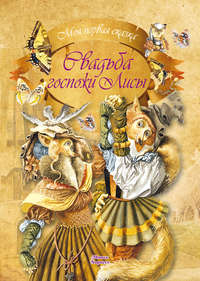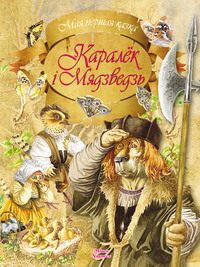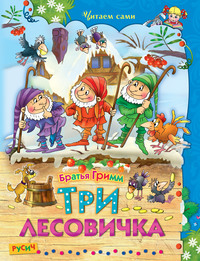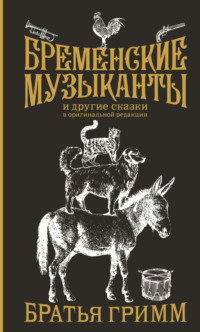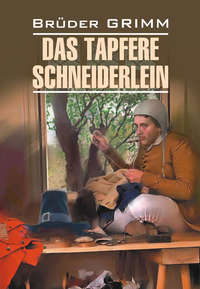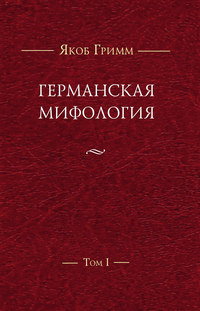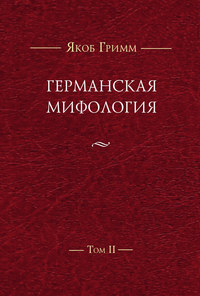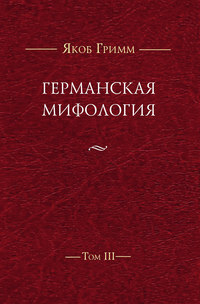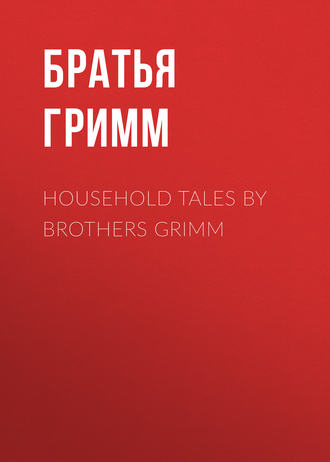 полная версия
полная версияHousehold Tales by Brothers Grimm
After this Marlinchen came into the kitchen to her mother, who was standing by the fire with a pan of hot water before her which she was constantly stirring round. "Mother," said Marlinchen, "brother is sitting at the door, and he looks quite white and has an apple in his hand. I asked him to give me the apple, but he did not answer me, and I was quite frightened." "Go back to him," said her mother, "and if he will not answer thee, give him a box on the ear." So Marlinchen went to him and said, "Brother, give me the apple." But he was silent, and she gave him a box on the ear, on which his head fell down. Marlinchen was terrified, and began crying and screaming, and ran to her mother, and said, "Alas, mother, I have knocked my brother's head off!" and she wept and wept and could not be comforted. "Marlinchen," said the mother, "what hast thou done? but be quiet and let no one know it; it cannot be helped now, we will make him into black-puddings." Then the mother took the little boy and chopped him in pieces, put him into the pan and made him into black puddings; but Marlinchen stood by weeping and weeping, and all her tears fell into the pan and there was no need of any salt.
Then the father came home, and sat down to dinner and said, "But where is my son?" And the mother served up a great dish of black-puddings, and Marlinchen wept and could not leave off. Then the father again said, "But where is my son?" "Ah," said the mother, "he has gone across the country to his mother's great uncle; he will stay there awhile." "And what is he going to do there? He did not even say good-bye to me."
"Oh, he wanted to go, and asked me if he might stay six weeks, he is well taken care of there." "Ah," said the man, "I feel so unhappy lest all should not be right. He ought to have said good-bye to me." With that he began to eat and said, "Marlinchen, why art thou crying? Thy brother will certainly come back." Then he said, "Ah, wife, how delicious this food is, give me some more." And the more he ate the more he wanted to have, and he said, "Give me some more, you shall have none of it. It seems to me as if it were all mine." And he ate and ate and threw all the bones under the table, until he had finished the whole. But Marlinchen went away to her chest of drawers, and took her best silk handkerchief out of the bottom drawer, and got all the bones from beneath the table, and tied them up in her silk handkerchief, and carried them outside the door, weeping tears of blood. Then the juniper-tree began to stir itself, and the branches parted asunder, and moved together again, just as if some one was rejoicing and clapping his hands. At the same time a mist seemed to arise from the tree, and in the centre of this mist it burned like a fire, and a beautiful bird flew out of the fire singing magnificently, and he flew high up in the air, and when he was gone, the juniper-tree was just as it had been before, and the handkerchief with the bones was no longer there. Marlinchen, however, was as gay and happy as if her brother were still alive. And she went merrily into the house, and sat down to dinner and ate.
But the bird flew away and lighted on a goldsmith's house, and began to sing,
"My mother she killed me, My father he ate me, My sister, little Marlinchen, Gathered together all my bones, Tied them in a silken handkerchief, Laid them beneath the juniper-tree,Kywitt, kywitt, what a beautiful bird am I!"
The goldsmith was sitting in his workshop making a gold chain, when he heard the bird which was sitting singing on his roof, and very beautiful the song seemed to him. He stood up, but as he crossed the threshold he lost one of his slippers. But he went away right up the middle of the street with one shoe on and one sock; he had his apron on, and in one hand he had the gold chain and in the other the pincers, and the sun was shining brightly on the street. Then he went right on and stood still, and said to the bird, "Bird," said he then, "how beautifully thou canst sing! Sing me that piece again." "No," said the bird, "I'll not sing it twice for nothing! Give me the golden chain, and then I will sing it again for thee." "There," said the goldsmith, "there is the golden chain for thee, now sing me that song again." Then the bird came and took the golden chain in his right claw, and went and sat in front of the goldsmith, and sang,
"My mother she killed me, My father he ate me, My sister, little Marlinchen, Gathered together all my bones, Tied them in a silken handkerchief, Laid them beneath the juniper-tree,Kywitt, kywitt, what a beautiful bird am I!"
Then the bird flew away to a shoemaker, and lighted on his roof and sang,
"My mother she killed me, My father he ate me, My sister, little Marlinchen, Gathered together all my bones, Tied them in a silken handkerchief, Laid them beneath the juniper-tree,Kywitt, kywitt, what a beautiful bird am I!"
The shoemaker heard that and ran out of doors in his shirt sleeves, and looked up at his roof, and was forced to hold his hand before his eyes lest the sun should blind him. "Bird," said he, "how beautifully thou canst sing!" Then he called in at his door, "Wife, just come outside, there is a bird, look at that bird, he just can sing well." Then he called his daughter and children, and apprentices, boys and girls, and they all came up the street and looked at the bird and saw how beautiful he was, and what fine red and green feathers he had, and how like real gold his neck was, and how the eyes in his head shone like stars. "Bird," said the shoemaker, "now sing me that song again." "Nay," said the bird, "I do not sing twice for nothing; thou must give me something." "Wife," said the man, "go to the garret, upon the top shelf there stands a pair of red shoes, bring them down." Then the wife went and brought the shoes. "There, bird," said the man, "now sing me that piece again." Then the bird came and took the shoes in his left claw, and flew back on the roof, and sang,
"My mother she killed me, My father he ate me, My sister, little Marlinchen, Gathered together all my bones, Tied them in a silken handkerchief, Laid them beneath the juniper-tree,Kywitt, kywitt, what a beautiful bird am I!"
And when he had sung the whole he flew away. In his right claw he had the chain and the shoes in his left, and he flew far away to a mill, and the mill went, "klipp klapp, klipp klapp, klipp klapp," and in the mill sat twenty miller's men hewing a stone, and cutting, hick hack, hick hack, hick hack, and the mill went klipp klapp, klipp klapp, klipp klapp. Then the bird went and sat on a lime-tree which stood in front of the mill, and sang,
"My mother she killed me,"
Then one of them stopped working,
"My father he ate me."
Then two more stopped working and listened to that,
"My sister, little Marlinchen,"
Then four more stopped,
"Gathered together all my bones, Tied them in a silken handkerchief,"Now eight only were hewing,
"Laid them beneath"
Now only five,
"The juniper-tree,"
And now only one,
"Kywitt, kywitt, what a beautiful bird am I!"
Then the last stopped also, and heard the last words. "Bird," said he, "how beautifully thou singest! Let me, too, hear that. Sing that once more for me."
"Nay," said the bird, "I will not sing twice for nothing. Give me the millstone, and then I will sing it again."
"Yes," said he, "if it belonged to me only, thou shouldst have it."
"Yes," said the others, "if he sings again he shall have it." Then the bird came down, and the twenty millers all set to work with a beam and raised the stone up. And the bird stuck his neck through the hole, and put the stone on as if it were a collar, and flew on to the tree again, and sang,
"My mother she killed me, My father he ate me, My sister, little Marlinchen, Gathered together all my bones, Tied them in a silken handkerchief, Laid them beneath the juniper-tree,Kywitt, kywitt, what a beautiful bird am I!"
And when he had done singing, he spread his wings, and in his right claw he had the chain, and in his left the shoes, and round his neck the millstone, and he flew far away to his father's house.
In the room sat the father, the mother, and Marlinchen at dinner, and the father said, "How light-hearted I feel, how happy I am!" "Nay," said the mother, "I feel so uneasy, just as if a heavy storm were coming." Marlinchen, however, sat weeping and weeping, and then came the bird flying, and as it seated itself on the roof the father said, "Ah, I feel so truly happy, and the sun is shining so beautifully outside, I feel just as if I were about to see some old friend again." "Nay," said the woman, "I feel so anxious, my teeth chatter, and I seem to have fire in my veins." And she tore her stays open, but Marlinchen sat in a corner crying, and held her plate before her eyes and cried till it was quite wet. Then the bird sat on the juniper tree, and sang,
"My mother she killed me,"
Then the mother stopped her ears, and shut her eyes, and would not see or hear, but there was a roaring in her ears like the most violent storm, and her eyes burnt and flashed like lightning,
"My father he ate me,"
"Ah, mother," says the man, "that is a beautiful bird! He sings so splendidly, and the sun shines so warm, and there is a smell just like cinnamon."
"My sister, little Marlinchen,"
Then Marlinchen laid her head on her knees and wept without ceasing, but the man said, "I am going out, I must see the bird quite close." "Oh, don't go," said the woman, "I feel as if the whole house were shaking and on fire." But the man went out and looked at the bird:
"Gathered together all my bones, Tied them in a silken handkerchief, Laid them beneath the juniper tree, Kywitt, kywitt, what a beautiful bird am I!"On this the bird let the golden chain fall, and it fell exactly round the man's neck, and so exactly round it that it fitted beautifully. Then he went in and said, "Just look what a fine bird that is, and what a handsome gold chain he has given me, and how pretty he is!" But the woman was terrified, and fell down on the floor in the room, and her cap fell off her head. Then sang the bird once more,
"My mother she killed me."
"Would that I were a thousand feet beneath the earth so as not to hear that!"
"My father he ate me,"
Then the woman fell down again as if dead.
"My sister, little Marlinchen,"
"Ah," said Marlinchen, "I too will go out and see if the bird will give me anything," and she went out.
"Gathered together all my bones, Tied them in a silken handkerchief,"Then he threw down the shoes to her.
"Laid them beneath the juniper-tree, Kywitt, kywitt, what a beautiful bird am I!"Then she was light-hearted and joyous, and she put on the new red shoes, and danced and leaped into the house. "Ah," said she, "I was so sad when I went out and now I am so light-hearted; that is a splendid bird, he has given me a pair of red shoes!" "Well," said the woman, and sprang to her feet and her hair stood up like flames of fire, "I feel as if the world were coming to an end! I, too, will go out and see if my heart feels lighter." And as she went out at the door, crash! the bird threw down the millstone on her head, and she was entirely crushed by it. The father and Marlinchen heard what had happened and went out, and smoke, flames, and fire were rising from the place, and when that was over, there stood the little brother, and he took his father and Marlinchen by the hand, and all three were right glad, and they went into the house to dinner, and ate.
48 Old Sultan
A farmer once had a faithful dog called Sultan, who had grown old, and lost all his teeth, so that he could no longer hold anything fast. One day the farmer was standing with his wife before the house-door, and said, "To-morrow I intend to shoot Old Sultan, he is no longer of any use."
His wife, who felt pity for the faithful beast, answered, "He has served us so long, and been so faithful, that we might well give him his keep."
"Eh! what?" said the man. "You are not very sharp. He has not a tooth left in his mouth, and not a thief is afraid of him; now he may be off. If he has served us, he has had good feeding for it."
The poor dog, who was lying stretched out in the sun not far off, had heard everything, and was sorry that the morrow was to be his last day. He had a good friend, the wolf, and he crept out in the evening into the forest to him, and complained of the fate that awaited him. "Hark ye, gossip," said the wolf, "be of good cheer, I will help you out of your trouble. I have thought of something. To-morrow, early in the morning, your master is going with his wife to make hay, and they will take their little child with them, for no one will be left behind in the house. They are wont, during work-time, to lay the child under the hedge in the shade; you lay yourself there too, just as if you wished to guard it. Then I will come out of the wood, and carry off the child. You must rush swiftly after me, as if you would seize it again from me. I will let it fall, and you will take it back to its parents, who will think that you have saved it, and will be far too grateful to do you any harm; on the contrary, you will be in high favor, and they will never let you want for anything again."
The plan pleased the dog, and it was carried out just as it was arranged. The father screamed when he saw the Wolf running across the field with his child, but when Old Sultan brought it back, then he was full of joy, and stroked him and said, "Not a hair of yours shall be hurt, you shall eat my bread free as long as you live." And to his wife he said, "Go home at once and make Old Sultan some bread-sop that he will not have to bite, and bring the pillow out of my bed, I will give him that to lie upon."
Henceforth Old Sultan was as well off as he could wish to be.
Soon afterwards the wolf visited him, and was pleased that everything had succeeded so well. "But, gossip," said he, "you will just wink an eye if when I have a chance, I carry off one of your master's fat sheep." "Do not reckon upon that," answered the dog; "I will remain true to my master; I cannot agree to that." The wolf, who thought that this could not be spoken in earnest, came creeping about in the night and was going to take away the sheep. But the farmer, to whom the faithful Sultan had told the wolf's plan, caught him and dressed his hide soundly with the flail. The wolf had to pack off, but he cried out to the dog, "Wait a bit, you scoundrel, you shall pay for this."
The next morning the wolf sent the boar to challenge the dog to come out into the forest so that they might settle the affair. Old Sultan could find no one to stand by him but a cat with only three legs, and as they went out together the poor cat limped along, and at the same time stretched out her tail into the air with pain.
The wolf and his friend were already on the spot appointed, but when they saw their enemy coming they thought that he was bringing a sabre with him, for they mistook the outstretched tail of the cat for one. And when the poor beast hopped on its three legs, they could only think every time that it was picking up a stone to throw at them. So they were both afraid; the wild boar crept into the under-wood and the wolf jumped up a tree.
The dog and the cat, when they came up, wondered that there was no one to be seen. The wild boar, however, had not been able to hide himself altogether; and one of his ears was still to be seen. Whilst the cat was looking carefully about, the boar moved his ear; the cat, who thought it was a mouse moving there, jumped upon it and bit it hard. The boar made a fearful noise and ran away, crying out, "The guilty one is up in the tree." The dog and cat looked up and saw the wolf, who was ashamed of having shown himself so timid, and made friends with the dog.
49 The Six Swans
Once upon a time, a certain King was hunting in a great forest, and he chased a wild beast so eagerly that none of his attendants could follow him. When evening drew near he stopped and looked around him, and then he saw that he had lost his way. He sought a way out, but could find none. Then he perceived an aged woman with a head which nodded perpetually, who came towards him, but she was a witch. "Good woman," said he to her, "Can you not show me the way through the forest?" "Oh, yes, Lord King," she answered, "that I certainly can, but on one condition, and if you do not fulfil that, you will never get out of the forest, and will die of hunger in it."
"What kind of condition is it?" asked the King.
"I have a daughter," said the old woman, "who is as beautiful as any one in the world, and well deserves to be your consort, and if you will make her your Queen, I will show you the way out of the forest." In the anguish of his heart the King consented, and the old woman led him to her little hut, where her daughter was sitting by the fire. She received the King as if she had been expecting him, and he saw that she was very beautiful, but still she did not please him, and he could not look at her without secret horror. After he had taken the maiden up on his horse, the old woman showed him the way, and the King reached his royal palace again, where the wedding was celebrated.
The King had already been married once, and had by his first wife, seven children, six boys and a girl, whom he loved better than anything else in the world. As he now feared that the step-mother might not treat them well, and even do them some injury, he took them to a lonely castle which stood in the midst of a forest. It lay so concealed, and the way was so difficult to find that he himself would not have found it, if a wise woman had not given him a ball of yarn with wonderful properties. When he threw it down before him, it unrolled itself and showed him his path. The King, however, went so frequently away to his dear children that the Queen observed his absence; she was curious and wanted to know what he did when he was quite alone in the forest. She gave a great deal of money to his servants, and they betrayed the secret to her, and told her likewise of the ball which alone could point out the way. And now she knew no rest until she had learnt where the King kept the ball of yarn, and then she made little shirts of white silk, and as she had learnt the art of witchcraft from her mother, she sewed a charm inside them. And once when the King had ridden forth to hunt, she took the little shirts and went into the forest, and the ball showed her the way. The children, who saw from a distance that some one was approaching, thought that their dear father was coming to them, and full of joy, ran to meet him. Then she threw one of the little shirts over each of them, and no sooner had the shirts touched their bodies than they were changed into swans, and flew away over the forest. The Queen went home quite delighted, and thought she had got rid of her step-children, but the girl had not run out with her brothers, and the Queen knew nothing about her. Next day the King went to visit his children, but he found no one but the little girl. "Where are thy brothers?" asked the King. "Alas, dear father," she answered, "they have gone away and left me alone!" and she told him that she had seen from her little window how her brothers had flown away over the forest in the shape of swans, and she showed him the feathers, which they had let fall in the courtyard, and which she had picked up. The King mourned, but he did not think that the Queen had done this wicked deed, and as he feared that the girl would also be stolen away from him, he wanted to take her away with him. But she was afraid of her step-mother, and entreated the King to let her stay just this one night more in the forest castle.
The poor girl thought, "I can no longer stay here. I will go and seek my brothers." And when night came, she ran away, and went straight into the forest. She walked the whole night long, and next day also without stopping, until she could go no farther for weariness. Then she saw a forest-hut, and went into it, and found a room with six little beds, but she did not venture to get into one of them, but crept under one, and lay down on the hard ground, intending to pass the night there. Just before sunset, however, she heard a rustling, and saw six swans come flying in at the window. They alighted on the ground and blew at each other, and blew all the feathers off, and their swan's skins stripped off like a shirt. Then the maiden looked at them and recognized her brothers, was glad and crept forth from beneath the bed. The brothers were not less delighted to see their little sister, but their joy was of short duration. "Here canst thou not abide," they said to her. "This is a shelter for robbers, if they come home and find thee, they will kill thee." "But can you not protect me?" asked the little sister. "No," they replied, "only for one quarter of an hour each evening can we lay aside our swan's skins and have during that time our human form; after that, we are once more turned into swans." The little sister wept and said, "Can you not be set free?" "Alas, no," they answered, "the conditions are too hard! For six years thou mayst neither speak nor laugh, and in that time thou must sew together six little shirts of starwort for us. And if one single word falls from thy lips, all thy work will be lost." And when the brothers had said this, the quarter of an hour was over, and they flew out of the window again as swans.
The maiden, however, firmly resolved to deliver her brothers, even if it should cost her her life. She left the hut, went into the midst of the forest, seated herself on a tree, and there passed the night. Next morning she went out and gathered starwort and began to sew. She could not speak to any one, and she had no inclination to laugh; she sat there and looked at nothing but her work. When she had already spent a long time there it came to pass that the King of the country was hunting in the forest, and his huntsmen came to the tree on which the maiden was sitting. They called to her and said, "Who art thou?" But she made no answer. "Come down to us," said they. "We will not do thee any harm." She only shook her head. As they pressed her further with questions she threw her golden necklace down to them, and thought to content them thus. They, however, did not cease, and then she threw her girdle down to them, and as this also was to no purpose, her garters, and by degrees everything that she had on that she could do without until she had nothing left but her shift. The huntsmen, however, did not let themselves be turned aside by that, but climbed the tree and fetched the maiden down and led her before the King. The King asked, "Who art thou? What art thou doing on the tree?" But she did not answer. He put the question in every language that he knew, but she remained as mute as a fish. As she was so beautiful, the King's heart was touched, and he was smitten with a great love for her. He put his mantle on her, took her before him on his horse, and carried her to his castle. Then he caused her to be dressed in rich garments, and she shone in her beauty like bright daylight, but no word could be drawn from her. He placed her by his side at table, and her modest bearing and courtesy pleased him so much that he said, "She is the one whom I wish to marry, and no other woman in the world." And after some days he united himself to her.
The King, however, had a wicked mother who was dissatisfied with this marriage and spoke ill of the young Queen. "Who knows," said she, "from whence the creature who can't speak, comes? She is not worthy of a king!" After a year had passed, when the Queen brought her first child into the world, the old woman took it away from her, and smeared her mouth with blood as she slept. Then she went to the King and accused the Queen of being a man-eater. The King would not believe it, and would not suffer any one to do her any injury. She, however, sat continually sewing at the shirts, and cared for nothing else. The next time, when she again bore a beautiful boy, the false step-mother used the same treachery, but the King could not bring himself to give credit to her words. He said, "She is too pious and good to do anything of that kind; if she were not dumb, and could defend herself, her innocence would come to light." But when the old woman stole away the newly-born child for the third time, and accused the Queen, who did not utter one word of defence, the King could do no otherwise than deliver her over to justice, and she was sentenced to suffer death by fire.


